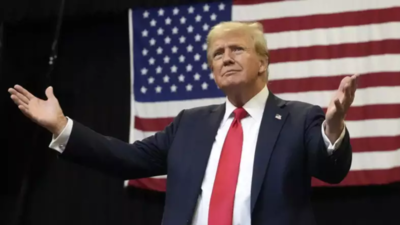
In a legal win for the President-elect Donald Trump, the judge in his criminal
hush money case
ordered on Friday that sentencing be delayed indefinitely.
"It is... ordered that the joint application for a stay of sentencing is granted to the extent that the November 26, 2024 date is adjourned," said judge Juan Merchan in an order, as Trump prepares for his White house return.
Donald Trump was also given permission to pursue dismissal of his criminal hush money case, following his conviction earlier this year, as reported by Reuters. ""The defendant's request for leave to file a motion to dismiss... is granted," also stated Judge Merchan's order.
The prosecutors from
Manhattan District Attorney
Alvin Bragg's office requested New York State Supreme Court Justice Juan Merchan earlier this week to consider postponing all case proceedings until after Trump completes his presidential term beginning January 20.
However, the Republican former president's legal team contends that the case requires dismissal, arguing that its continuation during his presidency would create "unconstitutional impediments" for him to perform presidential duties.
Whilst Bragg's office indicated they would contest the dismissal, they acknowledged Trump's right to present his arguments through written submissions.
On Friday, Justice Merchan established December 2 as the deadline for Trump to submit his dismissal motion, allowing prosecutors until December 9 to present their response.
In May 2024, Donald Trump was found guilty of falsifying business records related to a $130,000 payment made by his former lawyer, Michael Cohen, to adult film actress Stormy Daniels before the 2016 election. Daniels also alleged she had a sexual encounter with Trump, which he denies.
This marked the first time a US president was convicted of a criminal offense. Trump pleaded not guilty, claiming the case was politically motivated by the Manhattan District Attorney Alvin Bragg, a Democrat, to interfere with his campaign.
His legal team argued that continuing the case would "hamstring the operation of the whole governmental apparatus." The offense carries a maximum sentence of four years in prison, although experts have suggested alternatives like fines or probation due to the unlikelihood of imprisonment before his election.
Trump's victory over Kamala Harris in November 2024 complicated sentencing options, as imprisonment or probation could disrupt his presidential duties. This case is one of several legal challenges Trump faces, including issues surrounding classified documents and his efforts to challenge the 2020 election results.

 6 hours ago
2
6 hours ago
2









 English (US) ·
English (US) ·